The Magic community loves to speculate whenever Wizards of the Coast announces an update to the Banned and Restricted List, and I’m no different. Sometimes there is an obvious offender that Wizards wants to remove — Hogaak, Arisen Necropolis is a good example — but often, there is some room for interpretation. Speculation has some amount of competitive value as well: if you guess correctly, you can imagine what the new metagame may look like and get a leg up on solving it.
On Monday, July 13th, Wizards will be announcing changes to Historic, Pioneer, Pauper, and Modern. That’s a hefty update! I’ve spent the past few days pondering which cards might be banned, and today, I want to share my speculations with you.
Historic
Taking a quick look at some metagame data, the most popular deck in Historic is Simic Ramp at 6%, followed by Simic Nexus at 3%. These two Simic decks are clearly interested in ramping, but end the game in different ways. So, how might Wizards address both Simic Ramp and Simic Nexus while banning as few cards as possible? I believe the answer is to look for commonalities in the decks, and the one that stands out the most is Uro, Titan of Nature’s Wrath.
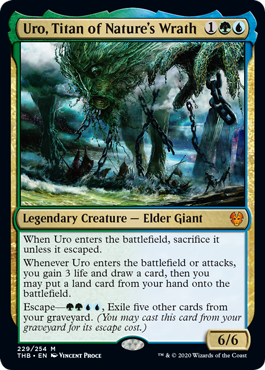
Removing Uro makes both Simic Ramp and Simic Nexus more manageable without changing the core identity of either deck. Typically, ramp decks are weak to hyper-aggressive strategies, but Uro is a ramp spell and allows Simic decks to stabilize their life total while accelerating. Should they ever escape Uro, the game is usually just over. The ramp decks won’t go without support cards, of course: there are plenty of other ways to put additional lands into play, without all the other bonuses you get from playing Uro. Deck-building choices are a sign of a healthy format; Uro is the best option at three mana in Simic colors, so Simic decks have little choice but to play it.
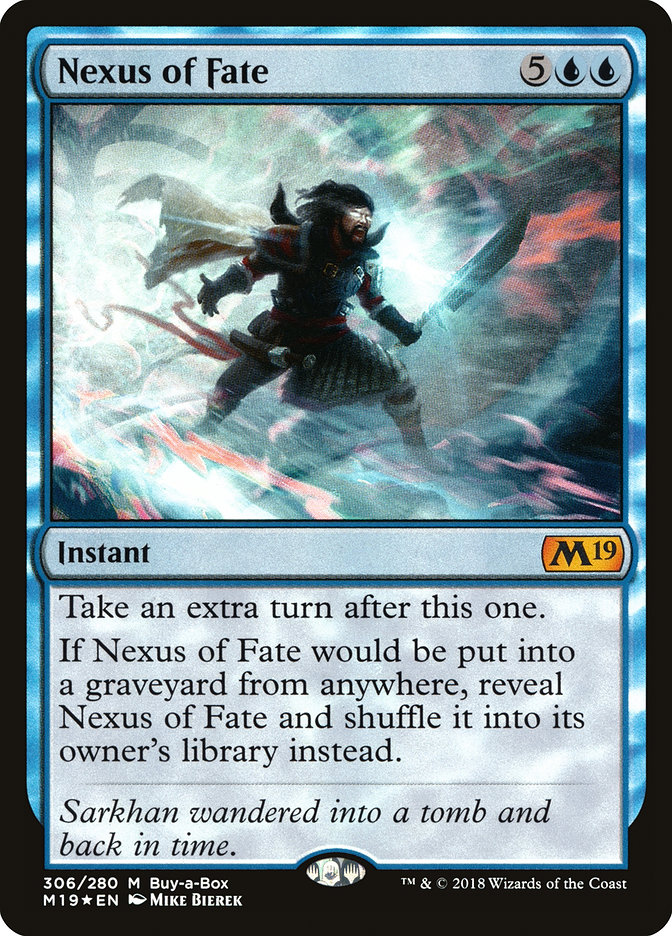
The other elephant in the room is Nexus of Fate. Truth be told, I’ve been an advocate for removing Nexus of Fate from as many formats as possible. Here’s my reasoning:
- Nexus prolongs games to an unhealthy degree
- It creates a lot of extra shuffling
- The physical copies are only available in foil, which increases the risk of marked cards in a tournament setting
- It was only available as a buy-a-box promo, which means fewer copies in circulation
- It creates monotonous and uninteresting play patterns
With all that being said, Nexus is on the short list of cards that can go, especially when you consider the precedent for banning it in other formats. But, ultimately, it depends on Wizards’ goals for Historic and how much of a hindrance Nexus is to the format.
Prediction: Uro and Nexus of Fate will be banned in Historic
Pioneer
Like Historic, Pioneer has two clear best decks: Inverter and Lotus Breach. Neither of these decks are strong enough that Wizards necessarily needs to ban either Inverter of Truth or Underworld Breach; instead, they could choose to take an efficiency piece away to bring these decks down a peg. Luckily, there’s one commonality between these decks: Thassa’s Oracle.
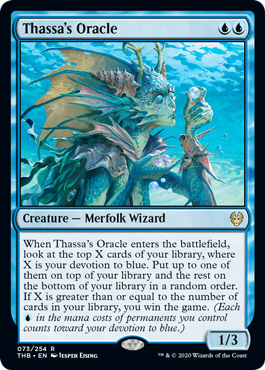
But wait, isn’t Thassa’s Oracle how both decks win the game? Kind of! Both Inverter and Breach prefer to win the game using Thassa’s Oracle because it’s the most efficient way to do so. But both decks also use Jace, Wielder of Mysteries as a backup plan. For an extra two mana, you get a Planeswalker that can help you dig to your other combo pieces — and, in the case of Inverter, facilitate a more controlling play style. Breach, on the other hand, often has large amounts of mana during their combo turn, so the extra cost of playing Jace is negligible. It just delays their game plan a bit so other decks can potentially catch up, which I believe is the goal with this ban.
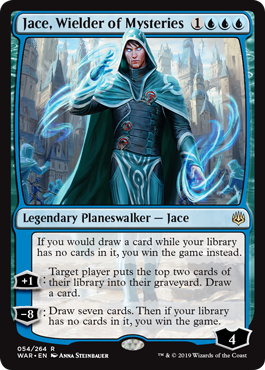
Other cards are certainly on the chopping block, including Dig Through Time. Banning Dig may not be very effective, though, as Treasure Cruise is incredibly easy to slot into the affected decks. The other two “contenders” in Pioneer — Burn and Mono-White Devotion — shouldn’t see any losses; both are popular because they can attempt to combat Inverter and Breach effectively.
Prediction: Thassa’s Oracle will be banned in Pioneer
Modern
In Modern, all the buzz is about Snow Control decks, all of which are putting up staggering results on Magic Online. I commend Wizards for attempting to make snow archetypes good in Modern (Skred was little more than a longstanding meme), but the “restrictions” on the new snow cards have been easy to work around.
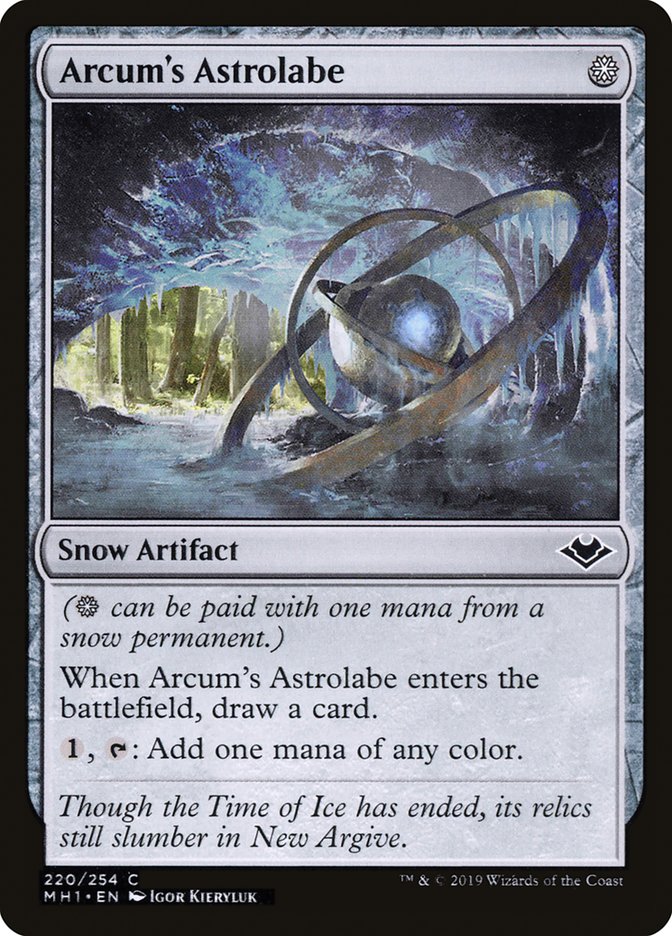
Arcum’s Astrolabe is a layup in the bannable cards department. Astrolabe is cost-efficient at just a single mana, and it simply does too much: it draws a card and enables a near-painless mana base. Snow decks tend to play three or more colors with 7-10 basic lands, nearly all of which are Islands, and only about two or three lands that produce more than one color. If not for Astrolabe, Snow players would be taking a lot more damage from their lands.
The intent behind Astrolabe’s design was clear: put a new spin on Prismatic Lens by adding a snow requirement and reducing the mana cost by one to compensate. But the shift from two mana to one is a huge power spike, and Astrolabe has proven to be too good if there are other snow cards worth playing.

Mystic Sanctuary may seem innocuous, but it turns every fetchland into the best card in your graveyard and every Cryptic Command into another Cryptic Command. Once you have a Cryptic Command every turn, winning the game is incredibly easy. Add Uro into the mix, and suddenly you get to cast all those Cryptic Commands without hindering your mana development and attack with a 6/6 unimpeded. The strength of the effect plus the ease of enabling it make Mystic Sanctuary too strong for Modern.
There’s an outside shot that Uro gets banned as well, but I think that’s unlikely to happen. If Arcum’s Astrolabe is banned, Uro’s escape cost becomes rather prohibitive, which may drive down its play rate.
Prediction: Arcum’s Astrolabe and Mystic Sanctuary will be banned in Modern
Pauper
Mystic Sanctuary poses the same issues in Pauper as it does in Modern. Pauper may not have fetchlands that can get nonbasic lands, but Mystic Sanctuary still has a very high power level in relation to the rest of the format. There is no Cryptic Command here, either, but Deprive, Fathom Seer, and Tragic Lesson all have the ability to abuse Mystic Sanctuary. In fact, Tragic Lesson serves as a pseudo-Cryptic Command, as it can also pick up Mystic Sanctuary to form an engine that will churn as long as you need it to.
Prediction: Mystic Sanctuary will be banned in Pauper
Conclusion
Perhaps, come Monday, we’ll learn that Wizards has come to these same conclusions. As is the nature of every ban announcement, players won’t always see eye to eye on things, and healthy discussion is always welcomed. If you have any thoughts on cards that should or shouldn’t be banned, be sure to let us know on Twitter!

Michael Rapp is a Modern specialist who favors Thoughtseize decks. Magic sates his desire for competition and constant improvement.

